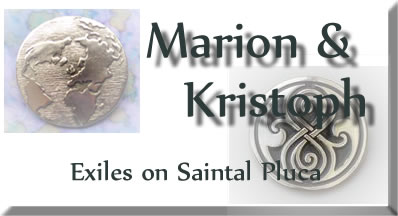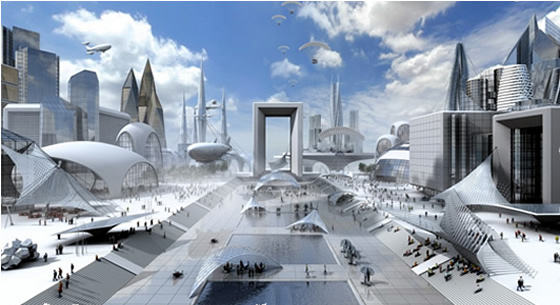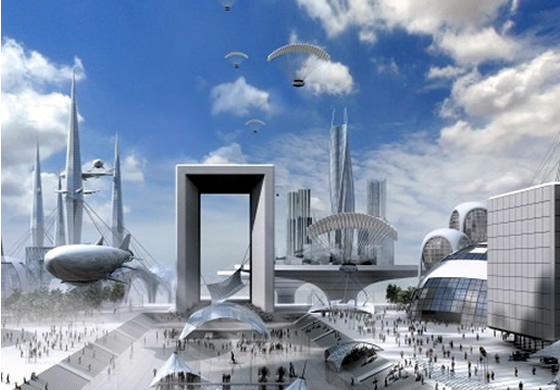

There were no horses on Saintal Pluca. It was another world where much of the surface was deep blue ocean. The few landmasses were almost entirely covered in the beautifully designed cities that the Saintalans lived in. Food was produced on hundred mile wide floating platforms where plants were grown by a sophisticated method of hydroponics. The closest thing to a horse was a zalanth, a cross between a dolphin and a sea horse. Trained ones were kept in sea stables. Rodan signed up immediately for the equivalent of a day’s pony trekking – exploring the ocean with other enthusiasts wearing her own specially fitted wetsuit and snorkel apparatus.
Kristoph was busy with the very important business of negotiator between the exiled government of Voesi I and the Candacy of Saintal Pluca. The Candac, the equivalent of a Crown Prince, was a generous man, and he had immediately accepted the Elders and their families as political refugees, installing them in one of his spare palaces, but that meant that Saintal Pluca was no longer neutral in the Voesi I crisis. The Candac had sided with the displaced Elders. To avoid war with the military junta Kristoph was seeking other allies to pledge support for the Elders. If enough Dominion and non-Dominion planets made it known that they WOULD support them militarily, then the chance of war was actually far less likely.
That was how he explained it to Marion, who pointed out that this was the theory behind the League of Nations, and look how that had turned out. Kristoph took her point grimly but promised that this situation was different.
Meanwhile, she kept the wives of the Elders company for the afternoon. They were all still a little shocked by the suddenness of the revolution on their home world and their even more sudden exile, but they were doing their best to be cheerful about it.
“This IS a very lovely city,” admitted Frega, the youngest of the wives as they sat at an outdoor table under a white sail-shaped sun diffuser that shaded them from the glare of the three suns. There were shimmering pools either side of the café area that reflected the different shapes of the sky-scrapers around the huge central plaza of Saintal-Prime. There was hardly a single building that was the same shape. For every square or rectangle of white concrete and glass there was a cone shape or a pyramid, a bubble or a twisted spire. The sail shaped sun diffusers came in all shapes and sizes. The biggest shaded whole buildings, the smallest were carried like parasols by people walking in the sun-drenched plaza. In the sky, micro-lites with sail-shaped wings were a popular means of personal travel, while cigar shaped airships with solar-sails above them were public transport between the island cities.
“The colours are so different,” Jega, wife of the Supreme Elder commented. “It is all so very white. Or blue. I haven’t seen a pink or purple anywhere.”
Marion had noticed that, too. There was no special rule about it, but electric blue and white were the most common colour of clothing for men and women. The buildings were mostly white with blue-tinted glass that reflected a blue sky.
Marion liked it. She thought it was like a very futuristic version of Liverpool, bustling with people on the wide promenades yet surprisingly quiet by the reflecting pools. In all the good ways it was like the waterfront by Pierhead, plus there was iced tea and melt in the mouth pastries while they sat and talked.
“It’s going to be home for us for a long time,” Frega pointed out. “I wonder if we’ll ever see our own world again.”
“You mustn’t give up hope,” Marion told her. “The ordinary people of Voesi didn’t want the military takeover any more than you did. The General cannot govern them with curfews and coercions for long. His coup will fail eventually.”
“But so many people will suffer until then. I feel guilty being here, safe, while they are under his thumb.”
“We had to go,” Negran, wife of the former foreign minister of the Elders pointed out. “He meant to have us all killed as examples to the ordinary people. I am sorry, too. But if we have to make the best of it in exile, then this is a good, friendly place to do so. It does look and feel so very different. I have never seen so many angles and straight lines in architecture as this. But we can get used to it. It’s just… architecture.”
“I think I could happily get used to angles and straight lines,” said the fourth member of the exiled women, Galan. “I don’t want to go back to Voesi after what happened. Those men… the soldiers loyal to the General... four of them forced their way into our home, breaking things, shouting. They made me kneel on the floor with guns pointed at my head. They said they were waiting the final order… to kill all of the enemies of the new regime…. I was an enemy of their regime just because my husband was Minister of Defence.”
The women nodded. They had all had a similar experience.
“Those soldiers swore allegiance to the Elders. They took their orders directly from my husband until they mutinied. Then they broke into my house and threatened to kill me. Even if the General is deposed, will those men be a part of the army, still? If so, I don’t think I could trust them. I would rather be an exile here, on this peaceful world where nobody will ever threaten me with a gun.”
“Don’t say that, Galan,” Jega told her. “We all went through the same ordeal. But we’re safe now. And when it is over, those who betrayed us will be punished, even those just following orders.”
Galan shook her head. She was adamant that she was no longer a Voesian. She was ready to embrace the culture of this new world of angles and reflections. Marion wasn’t entirely surprised that she was the quietest of the group, who had spoken only rarely before that outburst. Everyone else spoke of their time here as temporary, before going back in triumph to renew their lives on their home world.
She wasn’t sure which of them was right – Galan, wanting to close the door on her old life, or the others who looked to the future with hope.
And how long were they supposed to keep hoping for? Marion thought about the Human examples of political refugees in her own time – people who had defected from Russia or from North Korea or China, or the Dalia Llama, cut off from his home since he was a young man. For people like them the aspiration to return to their own countries was always there, but it was a more distant hope with every passing year. And the longer their exile went on, the more their homeland became an alien place, changed beyond recognition by war and social change, so that even if they could return they probably wouldn’t feel it WAS their home any more.
“Let’s go and look at the sculpture park,” she suggested when they had drawn out the iced tea and cakes as long as possible and run out of ways to talk about what was, as yet, impossible. “I am told it is quite impressive.”
The larger than life abstract sculptures were placed all along the oblong plaza, above the sunken recess where the reflecting pools stretched. They climbed the white stone steps and looked first at a piece called ‘Platonic Solids’. An apparently random pile of huge octahedrons and dodecahedrons made from a dull-grey-blue metal were bolted together in such a way that the top of the pile overhung, defying gravity.
To the women from Voesi, where architecture and sculpture was of an organic appearance, with no corners or angles and few flat sides, this was the very definition of alien. This was why Saintal Pluca was a place of refuge, not a home.
The next piece was called ‘sun-catcher’ and it was at least fifteen foot tall. It was the same grey metal underneath where a twenty-foot wide square ‘roof’ gradually narrowed to a mere stem that widened out again into a supporting base. People walked in and out of its shade, not completely understanding the title. From below it wasn’t possible to see that the topside of the roof was a reflective surface that glowed with the captured light of three suns. It was a working sculpture, producing enough electricity from the solar cells beneath the top-skin to illuminate the plaza at night.
The next piece was obviously inspired by the sails that had practical as well as decorative purposes around the plaza. It was made of a metal fretwork, though, and dappled light shone through it. Walking beneath the free-hanging structure was part of the experience of the sculpture. The Voesi women disliked it intensely. Their sun was so much gentler than the harsh white Saintal suns and the demarcation between light and shadow was softer.
Marion thought it was strangely disorientating and it took a while for her eyes to adjust afterwards, but she had no political or cultural objections to the piece.
“I think,” she said, glancing around at the cool white but distinctly geometric architecture. “You may all have to adapt for a while. I can see how Saintal is very different from Voesi, but it is a very lovely place and the people have been welcoming to you. That counts for a lot.”
“It’s easy for you, though,” Negran pointed out. “You’re only visiting here as the wife of the Gallifreyan president. “You don’t know what it’s like to be so far from all that is familiar to you.”
“Yes, I do,” Marion assured her. “When I left my home world to be Kristoph’s wife it took me a long time to get used to a different coloured sky, to a very different life, and even to people who hated me for being a foreigner. I DO understand that. And I’m here to talk to you about anything that might be upsetting you in these first days here in your temporary new home.”
That seemed to help. They cheered up a little and appreciated the rest of the huge, mostly very angular sculptures in the plaza.
The last of them was a remarkable piece of action sculpture that reminded Marion of an MC Escher drawing. The steps they climbed had exact duplicates above and when they went up the next flight they actually found themselves going down instead by a clever trick of geometry. Then a few steps down brought them to the top of the sculpture instead, where they could look back and see that spectacularly glowing top of the ‘Suncatcher’ and look through the huge rectangular Gate at the end of the plaza to the blue-grey ocean where a triangle sailed catamaran was heading to Saintal-Prime Harbour.
“How do we get down again?” Jega asked, viewing the complex way they had come.
“Straight down,” Marion answered, pointing to the perfectly simple set of steps with a handrail at the back of the structure. She saw something else, too, and waved enthusiastically. Kristoph was waiting on the plaza. He was smiling and waving back.
She took the steps slowly, all the same. It was a bit too steep to rush. When she finally stepped onto the solid ground he reached out and took her hand. She smiled warmly at him.
“Are you done with politics for today?” she asked him.
“I am,” he answered. He turned to the woman who accompanied her. “Ladies, your husbands are waiting in the Palace Of Government foyer. The Saintal Minister for extra-planetary affairs wants you to join them for high tea.”
“Are we not invited?” Marion asked as the four ladies left them.
“We were, but I thought you might like a bit of quiet time. Rodan is having a nap after her day’s exertions. I thought we would enjoy an aerial view of the islands by sail-plane, just the two of us.”
Marion looked at the small, two seater recreational planes with wide triangular solar sails that were for hire by the Gate.
“You’re going to fly one of those?”
“Of course,” he answered. “Do you trust me?”
“Implicitly,” Marion assured him.

 |
 |
 |